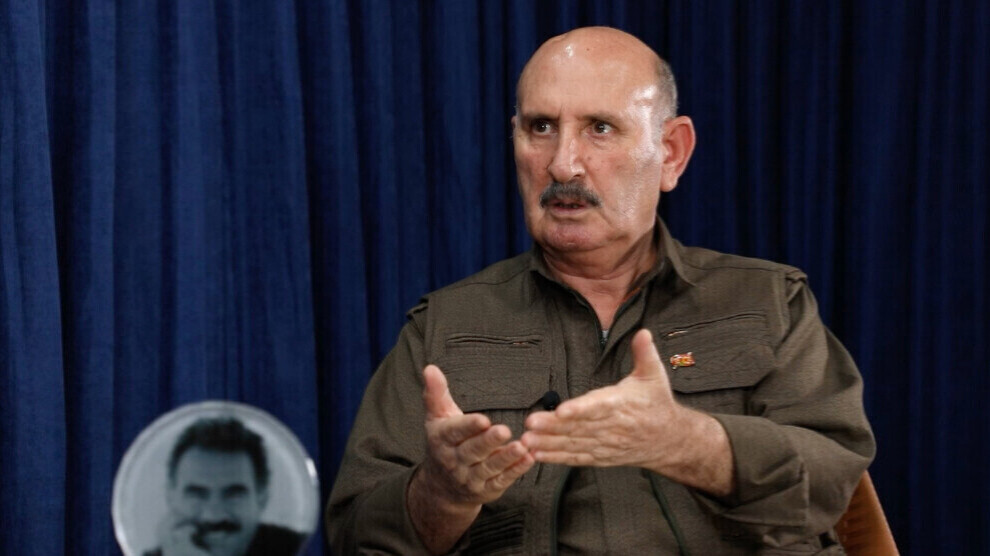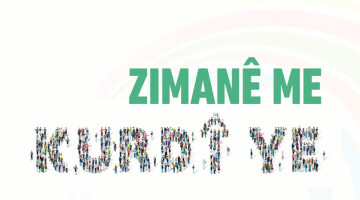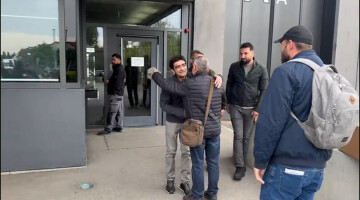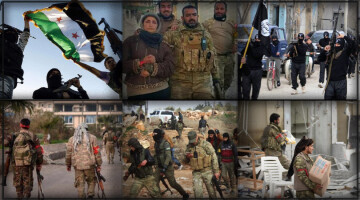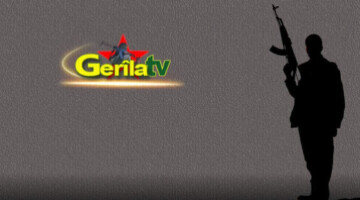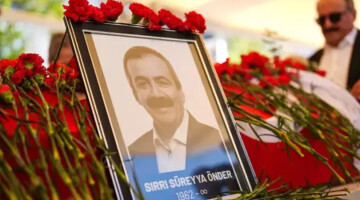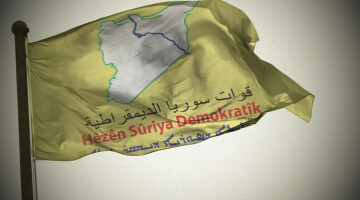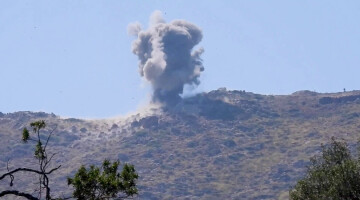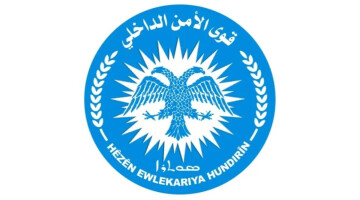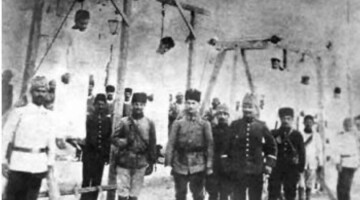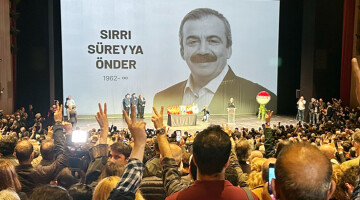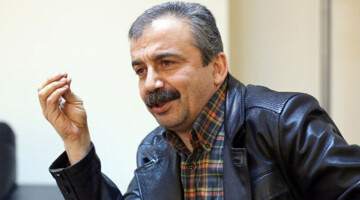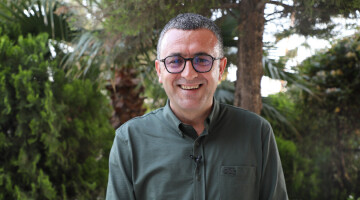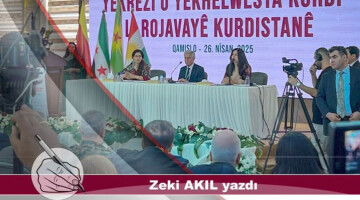In the second part of this interview, Sabri Ok, member of the KCK Executive Council, said that "The status determined a hundred years ago in the Middle East does not work any longer. The politics of the existing nation states and hegemonic powers are not the same. America, Britain, and Israel in particular are making plans for how they can rebuild the capitalist modernity system in the Middle East according to their own interests."
The first part of this interview can be read here.
In 2024, there were many developments in the Middle East that left their mark on the period. Most recently, the Baath regime was overthrown in Syria. How will these developments affect the year 2025?
At the end of 2023, a signal was given with the beginning of the Palestinian-Israeli war. This is where the shifting of stones in the Middle East began. Hamas suffered heavy blows in this war, and then the same thing happened to Hezbollah and Lebanon. Most recently, the regime in Syria has been overthrown. This seems to be a continuing strategy and one goal. And one has to particularly take a look at the set goal.
The status determined a hundred years ago in the Middle East does not work any longer. The politics of the existing nation states and hegemonic powers are not the same. America, Britain, and Israel in particular are making plans for how they can rebuild the capitalist modernity system in the Middle East according to their own interests. There were obstacles in front of them, and as I said, they destroyed those obstacles through the Palestinian-Israeli war and finally by turning Syria upside down. It is clear that this will continue, and this is the fear of the Turkish state. The stance of the Turkish state, which insists on itself, closed to change, and wants to play a role in the new Ottoman Empire, and the developments in the Middle East do not match.
There are certain goals that the Turkish state has set itself. One of these is to shape Iraq to suit its own interests. Iraq needs to see some realities and come to its senses. We don’t know how the Turkish state deceived them, how it pulled them into its axis, and how they ended up in such a bad situation today. Just recently, it was in the press that they raided some Kurdish institutions, women’s institutions; they wanted to close them down. They said it was a decision of the Iraqi state. They are collaborating with the KDP. But these are the demands of the Turkish state. The Turkish state is playing with Iraq. Just as it is playing on Sunnis with its SNA gangs in Syria, it wants to play on Sunnis and Turkmens in Iraq. It aims to structure and organize Iraq on the basis of its interests. This policy of the Turkish state is similar to the policies of America, Britain, and Israel towards Iraq. The Iraqi state still does not see this. Not so long ago, the government in Baghdad made some agreements with the Turkish state. The Turkish state has occupied their land. When Israel attacked Iran, Iraq immediately complained against Israel to the UN. They have the right to complain, but, on the other hand, the Turkish state has not only violated their territory; it has annexed it, it has placed thousands of forces on their territory, and a war is being waged here, yet they do not raise a voice against the Turkish state. And the agreements they made are still continuing. Iraq needs to see this and abandon these agreements as soon as possible.
The Iraqi state should be aware that after Syria, it will be them who come to the agenda. Maybe with the same method used in Syria, or maybe through a heavy embargo, or maybe through America, Britain, and Israel pushing some liberal people who are loyal to them and making the existing government ineffective. This could also be directed against Iran. Central Asia and the Middle East are a problem for these hegemonic powers. Because they want to secure their energy and trade lines from India to Israel via Cyprus to Europe, and they want to cut Iran off from China and Russia. Iran’s stance is a problem for them. It is hard to tell what exactly they plan to do, but we know that the only solution to this can be democratization. If both Iraq and Iran develop a radical change in the democratic sense and solve the Kurdish question, as well as the existing social and cultural problems with the perspective given by the model of democratic nation, they can eliminate these pressures against them. There is no other way. This is shown most prominently now in Syria.
If Bashar al-Assad, the Baath regime, had read and understood the developments over the last thirteen years correctly, had distanced himself from the ruling mentality, and had thought more strategically, he would have realized the importance of solving the Kurdish question and the need for change. Based on this, he could have implemented a crucial change in time, but instead, he insisted on himself, and the outcome of this now is in front of everyone’s eyes.
One hundred years ago, the Middle East was designed under the leadership of England and France, and today America, Israel, and England want to renew this. If a democratic paradigm, where women, youth, and all identities, beliefs, and cultures can live together freely, is not taken as a basis, the Middle East will once again be designed by the international capitalist powers. There is already a war going on right now, a Third World War.
Already many years ago, Rêber Apo [Abdullah Öcalan] had pointed out that a Third World War might break out in the Middle East and could continue until 2030. What matters is whether the democratic will of society will come to the fore. The realities of the Middle East and Europe are not the same. Because the Middle East is first and foremost a society, it has a more traditional, more rooted culture. Maybe not with a democratic paradigm, but it will resist somehow. Society itself is always open for a democratic paradigm to be organized. Until then, war and struggle continue in the Middle East. In 2025, these developments will continue. There are dangers, but opportunities are also coming up for the peoples and democratic forces. Undoubtedly, we need to make good use of these opportunities.
How do you assess the situation in Rojava and North and East Syria after the fall of the Assad regime? Did the SNA gang fall into a vacuum after the overthrow of Assad?
Looking at the Middle East, one quickly notices that Syria is different from the other Arab states. It may not have been more democratic, but it was more secular. It is a country where many beliefs and cultures could somehow live together. Despite the oppression and persecution of the state and the government, Syria is different from other Arab countries. Kurds, Arabs, Christians, Armenians, Muslims, and so on can live together democratically. This is a richness. But if a democratic system is not created, then this is not an opportunity but a major problem, because then everyone will be at each other’s throats, and war will break out. Under the Baath regime, the peoples were not free, they were all oppressed. And now, either they will turn against each other, or a democratic Syria will be built. Recently, a Turkish academic was talking on TV, and he stated that in 1860 in Syria, particularly in Damascus, people of different nationalities and beliefs were fighting each other, just like today. At that time, the Ottoman Empire ruled Syria. Even the Ottomans couldn’t solve the problem; they got desperate and called France, Germany, and Britain and asked them to come and help solve this problem.
The Baath regime is gone, and that’s good, but the mentality of the HTS and others that replaced it is closed to accepting women’s freedom and tolerating different beliefs, religions, cultures, and identities. It is against them. This will exacerbate the problems. If HTS came to Damascus and came to power today, it has received support from somewhere, and it is clear what this ‘somewhere’ is. It is first and foremost America, Britain, and Israel. They are now facing a test. If they are able to realize a change, if they are seen as reasonable by the international powers, they can be accepted. It is hard to assess what that reasonable point is, but, for example, there is the question of Rojava, the question of women, there are questions of faith, there is the oppression of Alevis and Durzis, and so on. Therefore, it is premature to say whether positive change will happen in Syria at their hands. Because what is seen now is that all the names assigned to important positions by the HTS leader are of ISIS and Al-Qaeda origin. It is not easy to change their mentality towards women, society, different beliefs, and religions. With them, it is not easy to create stability, democratize, or solve the problems in Syria.
When they are able to seriously change, they will be accepted by the hegemonic forces. But as a matter of fact, this current situation also suits the hegemonic powers; they don’t have to risk anything themselves, and they don’t shed blood. It is the peoples of this region who are fighting each other, who are exhausting each other. The weaker they become, the more they turn to America and Europe. The hegemonic powers know this, and they exploit it. I predict that the serious problems will continue in Syria and might even deepen.
The Turkish state is currently staging itself as the most successful state. Maybe they have tied some gangs to themselves; they can wage a war against Rojava and the Kurdish people, but the Turkish state has no role in the future of Syria. Because the gangs and mercenaries affiliated with the Turkish state are neither homogeneous nor ideological, they have come together for salaries and money. Each of them came from a different region of Syria. They came from Hama, Homs, Aleppo, Damascus, and so on. Now they think that these cities have been liberated, so what are they doing in Manbij, Kobane, Gire Spi, and Serekaniye? That is why they want to leave, want to run away.
As was shown in the press, the SDF and the autonomous self-administration are encouraging them to leave and making appropriate calls. And they are doing a good job. But the Turkish state is preventing the gangs and mercenaries from leaving. These gangs and mercenaries have become a nuisance for the Turkish state; they don’t want to fight, as they can’t get results anyway, so the Turkish state has fallen into a vacuum. They made all their calculations based on the SNA. As far as we know, HTS in Damascus does not plan to give Turkey any role. The Turkish state will not have a very big role in the future Syria. Maybe economically, commercially, but regarding the political future of Syria, the Turkish state is in a vacuum. Those who paved the way for Bashar al-Assad’s departure and regime change will not allow the Turkish state to have an influence on HTS.
If they want to understand the situation in Syria, if they want to see where the process will go, if they want to know how the problem will be solved, they should see the picture in Rojava and North and East Syria. For more than thirteen years, Kurds, Arabs, Christians, Armenians, Assyrians, and Turkmens have lived together in a free and democratic way. They have built a system where everyone lives with their own identity and with dignity. In order for this democratic system to be built throughout all of Syria, Syria must turn its attention to Rojava.
When the Middle East was designed during the First World War, the will of the Kurdish people was ignored. Now, over one hundred years later, the Middle East is being redesigned, and this time the Kurdish people have a decisive power. What role and mission do Kurdish parties, institutions, and organizations have to play in order for the Kurdish people to have a status in this process? What attitude should Kurdish artists, intellectuals, and patriots adopt?
The Kurdish people are very well aware of what is happening, and the organizations of the Kurdish people must also have a clear vision of what is going on. A historical process is taking place. We have already talked about the changes in the Middle East. However, the Kurdish people are the most dynamic force, the most open to developments, the most democratic, and the most willful power. Unless the Kurdish question is solved, democratization of the Middle East is not possible. One hundred years ago, the occupying powers tricked the Kurdish people. They said it would be against the interests of the Kurdish people to have a status, and the Kurdish people were not able to unite and show a common will at that time. We suffered from this for more than one hundred years. But today the situation is different. Rêber Apo has a 50-year paradigm; there are many organizations in the four parts of Kurdistan that are working and struggling. There is a history and experience. A united national spirit and will must emerge as soon as possible. This is the dream and hope of the Kurdish people. Any party in Kurdistan, anyone questions why Kurds are not united. They criticize, and rightly so. If the Kurds are not united, no part, no organization has any security. They form one will together.
Important developments are taking place in the Middle East, and there are some things that need to be said on behalf of the Kurdish people. The people need to put forward this will, but as long as they remain fragmented, the occupying forces take advantage of this. This must be prevented. Rêber Apo always offered a perspective on this issue; he approached it in a very humble way. We don’t want anything for the PKK; we just want Kurds to be united. The practices so far have been important; efforts have been made, but unfortunately, unity did not happen. But today, as the most suitable conditions are arising, Kurds must unite as soon as possible. The PKK is always ready for this. Every organization and every Kurd should be ready for this as well. One or two principles are enough for this; firstly, patriotism. Every patriot has a role to play. And secondly, no movement or individual should disregard the rights of the Kurdish people by siding with the Kurdish enemies and occupation forces. They may have economic or other relations, but they should not oppose the future, destiny, gains, and freedom of the Kurdish people.
To those who are wondering how the Turkish state or other states will react to this, how long is this supposed to go on? The crucial point is that if we join forces, no state can stop us. Then they must respect the will of the Kurdish people and take it seriously. Maybe a conference or congress will take time; it is not something that can be done in one day, but Kurdish forces can establish a mechanism among themselves. When something needs to be said about what is happening in the Middle East, this mechanism should be used to give a joint statement and take a joint stance. This would serve the democratic resolution of the Kurdish question and the democratization of the Middle East. The Kurdish question is such a fundamental problem. That is why unity is needed as soon as possible. The PKK is always ready for this. Our comrades have expressed this many times. Such a work is very important and historic.

